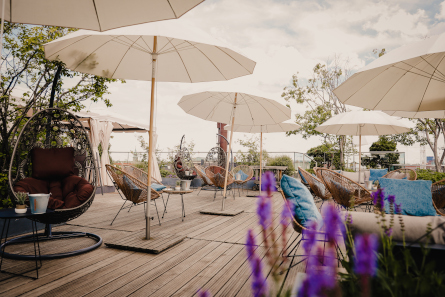La Traviata♪, G. Verdi, the 14.
Lisette Oropesa♪, Meg Brilleslyper, Granit Musliu,
Luca Salsi♪
_445x297(CosmoPark).jpg)
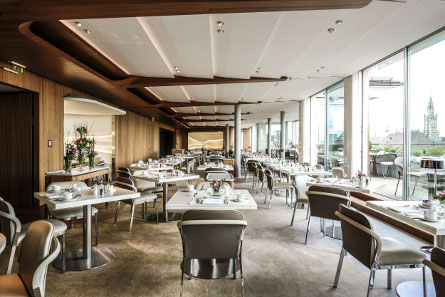
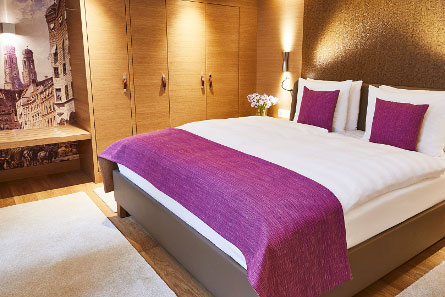

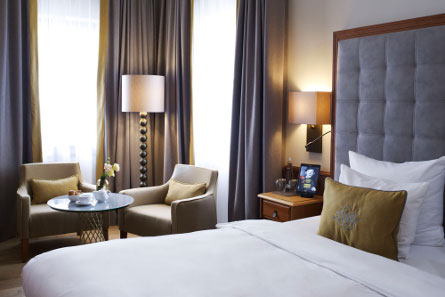
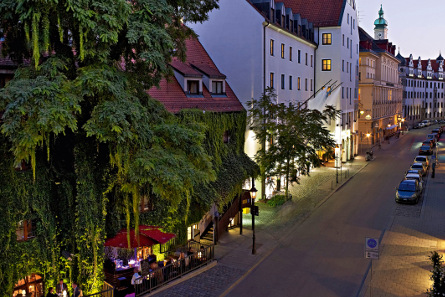

from Thursday 13 to Sunday 16 November 2025, 3 nights
Arrangement 2
Arrangement 2
La Traviata
G. Verdi
G. Verdi
The last piece of the so-called trilogia popolare is a work of complete inner life and is rightly regarded as one of the masterpieces unsurpassed in the Romantic genre. Giuseppe Verdi (1813-1901) used the famous novel “La dame aux camélias” by the French writer Alexandre Dumas as his literary model; only the names of the protagonists were changed.
Although the opera was a great success from a musical point of view, at the same time the moral, overly permissive and liberal attitude of the work was criticized. With the “traviata” (= the Fallen woman) Verdi drew a highly sensitive main character on whom his whole attention is focused - like a psychological study of human nature with all its vices, hardships and desires, but also the ability to renounce for the sake of loved ones.
From the first note there is a suggestion of a soul drama that begins with an intimate prelude instead of the usual overture in the classical style. As an autobiographical element, the theme certainly includes the fact that Verdi’s partner Giuseppina Strepponi suffered from a serious illness and that Verdi, who had lost his first wife at an early age, also feared for her life. In addition, the composer’s relationship with Strepponi caused him slander, so that he used this theme artistically in the figure of his father, Germont, who was a well-behaved man.
The premiere in 1853 at the Teatro La Fenice turned out to be a farce due to several factors. On the one hand, certainly because Verdi held up an unwanted mirror to Italian society with this subject, on the other hand because of the vocal deficits of the interpreters. One year later, however, also in Venice and only slightly modified, the worldwide, unbroken triumph of “La traviata” began. Today the tragic love story around the courtesan Violetta is the most popular opera of Verdi and one of the most frequently performed works ever.
Although the opera was a great success from a musical point of view, at the same time the moral, overly permissive and liberal attitude of the work was criticized. With the “traviata” (= the Fallen woman) Verdi drew a highly sensitive main character on whom his whole attention is focused - like a psychological study of human nature with all its vices, hardships and desires, but also the ability to renounce for the sake of loved ones.
From the first note there is a suggestion of a soul drama that begins with an intimate prelude instead of the usual overture in the classical style. As an autobiographical element, the theme certainly includes the fact that Verdi’s partner Giuseppina Strepponi suffered from a serious illness and that Verdi, who had lost his first wife at an early age, also feared for her life. In addition, the composer’s relationship with Strepponi caused him slander, so that he used this theme artistically in the figure of his father, Germont, who was a well-behaved man.
The premiere in 1853 at the Teatro La Fenice turned out to be a farce due to several factors. On the one hand, certainly because Verdi held up an unwanted mirror to Italian society with this subject, on the other hand because of the vocal deficits of the interpreters. One year later, however, also in Venice and only slightly modified, the worldwide, unbroken triumph of “La traviata” began. Today the tragic love story around the courtesan Violetta is the most popular opera of Verdi and one of the most frequently performed works ever.
Henrik Nánási - Günter Krämer
Lisette Oropesa
Born in New Orleans in 1983, Lisette Oropesa is one of the most sought-after (coloratura) sopranos of her generation. With her extensive repertoire of roles, she is a guest on all the great stages of the world. The soprano with Cuban roots made her debut at the Metropolitan Opera New York, where she shone in the roles of Susanna (Le nozze di Figaro), Gilda (Rigoletto) and Nannetta (Falstaff). After numerous guest engagements in the United States, she has since conquered the European opera stages, from the Teatro Real in Madrid to the Bavarian State Opera in Munich, from the festival stages of the Arena di Verona to the Finnish Savonlinna. The soprano has also received much applause for her brilliant bel canto role of Lucia in Donizetti’s Lucia di Lammermoor, with which she made her house debut at the Royal Opera House in London.
At the International Opera Awards 2020 Lisette Oropesa was nominated in the category Female Singer.
At the International Opera Awards 2020 Lisette Oropesa was nominated in the category Female Singer.
Luca Salsi
The Italian Luca Salsi, born in Emilia Romagna in 1975, is known for his Italian repertoire, especially his Verdi repertoire, as well as for parade roles such as Baron Scarpia. The baritone works with all renowned conductors and is a guest on the world’s major stages. He has already opened the season twice at La Scala in Milan: in 2017 in Giordano’s ,Andrea Chénier’ and in 2019 in Puccini’s ,Tosca’. (as of 2024)
Staatsoper
Cavalleria Rusticana / I Pagliacci, P. Mascagni / R. Leoncavallo, the 15.
Elīna Garanča♪, Ailyn Pérez,
Vittorio Grigolo♪, Yonghoon Lee
Antonino Fogliani - Francesco Micheli
Elīna Garanča
Mezzo-soprano Elīna Garanča was born in 1976 in Riga into a family of musicians. She began her musical studies at the age of 5 at the piano. In 1996, she studied singing at the Latvian Academy of Music, then moved to Vienna and the United States. While still a student, she made her stage debut in 1998 as a quick replacement to play Giovanna Seymour in Donizetti’s Anna Bolena at the Opera in Riga, Bucharest and Athens. Elīna Garanča then joined the Meiningen Theater troupe, then the Frankfurt one and finally the Vienna State Opera. In 2003 Elīna Garanča became known internationally by singing the role of Annio in Mozart’s La Clémence de Titus at the Salzburg Festival under the baton of Nikolaus Harnoncourt. On the strength of her success, she begins to do a series of roles.
Vittorio Grigolo
The tenor Vittorio Grigolo was born on February 19, 1977 in Arezzo, Tuscany, and grew up in Rome in a family of music lovers. He discovered a passion for music at the age of 4, then joined the Sistine Chapel Choir at the age of 9, where he remained there for four years as a soloist. Vittorio Grigolo made his opera debut at 13 as Little Shepherd in Tosca at the Rome Opera House, opposite Pavarotti. From then on, he was nicknamed Il Pavarottino (the Little Pavarotti) by the Italian press. Vittorio Grigolo joined the Vienna Opera at the age of 18 before becoming the youngest singer debuting on the stage at La Scala in Milan at 23 for two concerts conducted by Riccardo Muti. Attached to his roots, Vittorio Grigolo distinguished himself in various Verdian roles and having studied at a French college, the tenor developed a great interest in French romantic opera.
Staatsoper
Hotel informations for Munich 2
Rosewood Munich *****
Newly opened at the end of 2023, luxury hotel Rosewood Munich ***** is ideally located in the heart of Munich’s old town. Spread over two adjoining historic buildings - the entrance still bears witness to the past as Königlich Bayerische Bank -, the hotel has a total of 132 spacious, elegant rooms and suites. Custom-made furnishings and Bavarian style elements as well as a marble bathroom with underfloor heating ensure a cozy atmosphere. Culinary delights from à la carte breakfast to dinner await you in the Brasserie Cuvilliés with innovative Alpine gourmet cuisine, while the Jazz Bar Montez invites you to round off the day in style. The State Opera is just a 5-minute walk away.
_445x297(CosmoPark).jpg)

Bayerischer Hof *****
Since 1841, the luxurious Hotel Bayerischer Hof ***** has welcomed its guests on Promenadeplatz, just a few minutes’ walk from the State Opera. The comfortable rooms are decorated in historical-classical style up to subtle colours in the modern, newly renovated Cosmo Park rooms. Start with a champagne breakfast above the rooftops of Munich and enjoy Bavarian and Far Eastern specialities or fine gourmet cuisine in the bars and restaurants. Whetherroof terrace, SPA, cinema, boutiques or hairdresser - the hotel has all the amenities you need to spend an entertaining day.


Vier Jahreszeiten Kempinski *****
The Vier Jahreszeiten hotel ***** is, since 1858, an establishment of long tradition. It is located in the city centre on the Maximilianstrasse and only two minutes away on foot from the Opera. Offering 303 rooms and 62 luxurious suites, there are also numerous facilities to take advantage of. Its restaurant, Schwarzreiter, enjoys an excellent reputation and it is particularly appreciated after an evening at the Opera.


Platzl Hotel ****
The Platzl hotel **** welcomes you in a charming atmosphere in the heart of Munich, only a few minutes away from the Opera. Its 167 rooms are comfortably equipped and tastefully decorated. The hotel also offers a restaurant of typical Munich ambience in a vaulted room as well as a health spa with sauna and Turkish bath.
All-inclusive price per person for Munich 2
Single room/ night
Rosewood Munich
from 2.450,- Euro
Auf Anfrage
Bayerischer Hof
from 1.840,- Euro
140-250,- Euro
Vier Jahreszeiten Kempinski
On request
130-240,- Euro
Platzl Hotel
1.470,- Euro
90-200,- Euro

The price includes
Overnights including breakfast, good opera tickets






_445x297.jpg)
